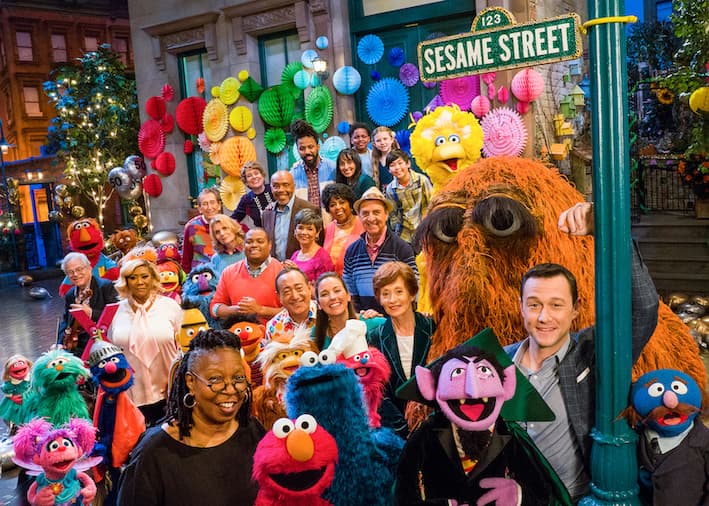Advocacy
Landmark 50th season of Sesame Street showcases persistence and resilience

Freya Lucas
Jul 10, 2020
Save
Iconic children’s television program Sesame Street will kick off its historic 50th season tomorrow, July 11, with a ‘star studded’ special on ABC Kids, ahead of a season of programming which focuses on “Oops and Aha!: Embracing the Power of Possibilities” with the aim of helping parents and children to learn more about how to combat the stresses and pressures they face in their daily lives.
Ahead of the launch The Sector editor met with Grover and Autumn Zitani, Content Producer at Sesame Workshop, to learn more about the intersection of content production and pedagogy, producing children’s content which deals with some challenging topics, and all the ‘ins and outs’ of the big celebration...including whether or not Cookie Monster remembered that cake is a sometimes food.Sesame Street first aired in 1969, at the height of the civil rights movement and the war on poverty, and was the first program to try and answer a simple yet powerful question: could television help prepare children from less advantaged backgrounds for school? Fast forward to 2020, and Sesame Street is known to families in more than 150 countries, in 70 languages, and celebrating its 50th season, which kicks off with a celebration hosted by Joseph Gordon Levitt, and reimagines classic songs and segments such as “People in Your Neighborhood” and “It’s Not Easy Being Green.”
As well as cameos from familiar faces like Kermit the Frog, and celebrity visits from Whoopi Goldberg, Patti LaBelle, Elvis Costello and many more, the 50th season will see a new neighbour, Charlie, move into Sesame Street - the first child to join the cast in more than 20 years.
We asked Grover about 8 year old Charlie, whose family are serving in the military. He told us Charlie is a very friendly girl, who is close with everyone on Sesame Street, “including, believe it or not...Oscar the Grouch!”
Programming from a place of pedagogy For those who have viewed episodes of Sesame Street, the underpinnings of pedagogy and progressive thinking in terms of early childhood development is clearly evident.
We asked Autumn how the creators of the show work with early childhood experts to ensure the content is reflective of best practice, and the needs of children as they evolve over time?
“Since the beginning of Sesame Street” she explained “the idea has been that production, curriculum and research would all work hand in hand.”While each of the departments approach their work from a different perspective, Autumn continued, they all come together to come to a place where they feel there is a mixture of entertainment, engagement and education.
“It’s a really fine line” she continued “but I think that’s what’s amazing about Sesame Street. We continue to be able to figure it out along the way.”
Dealing with challenging topicsOne of the features of Sesame Street has always been the capacity to discuss and explore topics which are confronting for some families, but which are part of the lived reality of many children. Sesame Street was the first racially integrated television show, the first children’s show to feature a child with Downs Syndrome, and more recently, be willing to tackle challenging topics such as having a parent who is incarcerated, or dealing with parental substance addiction.
We asked Autumn about creating programming which deals with these sometimes confronting challenges.
“Those types of topics” she explained, “come out of our social impact work, for those families and populations who really need that help, and who are dealing with those types of issues.”
“There’s a need out there, and we hear that all the time. Families and children are going through this, and adults are looking for resources to support them in explaining these types of things to their children in an age appropriate way.”Rather than asking if it’s appropriate to speak with children about these topics, she continued, the question becomes “how can we speak about this issue in an age appropriate way?”
Oops and aha - a focus of resilience and working through challenges 2020, Autumn explained, is in many ways the perfect time to introduce this topic to children.
“Learning that you can make mistakes, and be in frustrating situations, and that’s ok. It’s not about giving up, it’s about regrouping and saying it’s ok, I can do it, I can try again.”
Before season 50 began, the team consulted with educators and parents about what they were seeing in their lives with children. One theme came up over and over again - self regulation skills and executive functioning were challenging for children, and children are “really feeling stressed.”
From this standpoint, the team came up with the concept of embracing “oops and ahas” and encouraging self confidence, task persistence and positive thinking - not just showing those moments, but also giving children a toolkit of strategies to use when they encounter those moments.
The start of the 50th season of Sesame Street will take place on Saturday July 11, with the first episode premiering on Wednesday 15 th July at 9.30am on ABC Kids.
“As we mark our 50th season, we want to remind families everywhere of the timeless lessons Sesame Street has always taught,” said Steve Youngwood, President of Media & Education and Chief Operating Officer of Sesame Workshop. “Everyone, no matter where they are from, is equally deserving of respect, opportunity, and joy.”
Don’t miss a thing
Related Articles



















